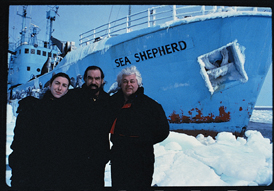"After his discharge, a brief marriage left young J.P. alone to raise his son as a single parent. Times went from bad to worse. “It was one of the most frightening times in my life,” says DeJoria. “I was homeless twice, mainly because I was too proud to ask anybody for help. In my early twenties, when it was just me and my son, we had no place to live. I used to go out and collect Coke bottles at night, then cash them in at the corner drugstore for two to five cents. We lived on a very simple diet of rice, potatoes, lettuce, cereal, canned soup, and macaroni and cheese, but we managed.”
He took on a variety of odd jobs to make ends meet from pumping gas and repairing bicycles, to selling encyclopedias door-to-door, then copy machines, and even insurance. As luck would have it, he was offered an entry-level marketing position with Time magazine. Before long, he found himself the Los Angeles circulation manager, well on the way to his next brush with fate. By 1971, he went to work for Redken Laboratories, then the leading professional hair salon product company in the U.S. Within 18 months, he was promoted to national manager overseeing their schools and chain salons, eagerly learning everything there was to know about the business.
 Then in 1980, DeJoria jumped at the chance to join forces with longtime friend, and famed hair designer, Paul Mitchel. Neither had much in the way of material wealth at the time, but they managed to scrape together $700 to initially bankroll the company with Paul doing the hair shows, and J.P. overseeing all the sales, marketing, administration, and everything else. The rest is, as they say, history.
Then in 1980, DeJoria jumped at the chance to join forces with longtime friend, and famed hair designer, Paul Mitchel. Neither had much in the way of material wealth at the time, but they managed to scrape together $700 to initially bankroll the company with Paul doing the hair shows, and J.P. overseeing all the sales, marketing, administration, and everything else. The rest is, as they say, history.Today, DeJoria heads the multi-million dollar hair empire of John Paul Mitchell Systems with annual retail sales well over $800 million, offering more than 90 products sold in 105,000 hair salons throughout the U.S. and in 75 countries abroad. When not working to expand the JPM brand, JP travels the globe with wife, Eloise and son, John Anthony as stuards of the planet
I will give the link to the website of the above at the bottom of of this article.
I would like to share one thing about him with you, especially ladies making homebased products.
When J.P started, he went door to door of saloons, trying to get them to buy his product and recommend it to the patrons of the saloons. It was tough because his product was unknown and there were a host of branded items on the shelf at the time. But he persisted and eventually managed to get a few saloon to use his products.
In the Malaysian context, there are many entrepreneurs who invented foodstuff and have homemade business. The products are made with passion, affection and determination. The reasons are varied, some because the producers themselves are housewives or women trying to assist the family - working passionately to make sure the product is good; some simply love their mom's recipe. In the end, just like J.P, you have a good product.
Then some would appoint agents to sell these products, either on direct selling basis or opening up stalls at marketplace and bazaar. These are your channels (for those who attended the Money-First Business Model). Just like J.P, he has his saloon.
But what J.P did next was amazing. He promised his saloon that he will NEVER sell his product directly to the consumer. It will always be and only be sold to saloon. It will never be on the shelf of supermarket or pharmacies. If the consumer wants to buy, they can buy it only at the saloon. This means that J.P would only get rich if the saloon gets rich. And the saloons appreciated that. They began to promote J.P's products more based on this premise and the rest is history.
The idea that I want to throw is this. Remember who made you the first profit. If it is the agents, appreciate them and don't undercut them. Appreciate your partner and your partner will appreciate you. Some of us would be tempted at the prospect of selling to the big supermarkets directly to the customers. We THINK there would be better margin there. But we forget that not only it is a different model (which we are not familiar with), it can result in us losing focus on the partners and team that was printing money for us.
I am not saying going big with the supermarket consignment is not the way, I am just saying that there is another way to grow. And the growth path for your home-made biscuits is different than Nestle. You follow Nestle's path to the supermarket without the resources and business model Nestle use, you can lose the shirt on your back.
Work Smart People
-end-
The Author is the principal of ElixirEducate- a training house for Smart Entrepreneur Training Series. He was an international investment banker, corporate financier and now serial entrepreneur and business coach. You can find more information on ElixirEducate at their facebook page, here. And be a facebook friend of Yazdi
J. P Dejoria Article

No comments:
Post a Comment